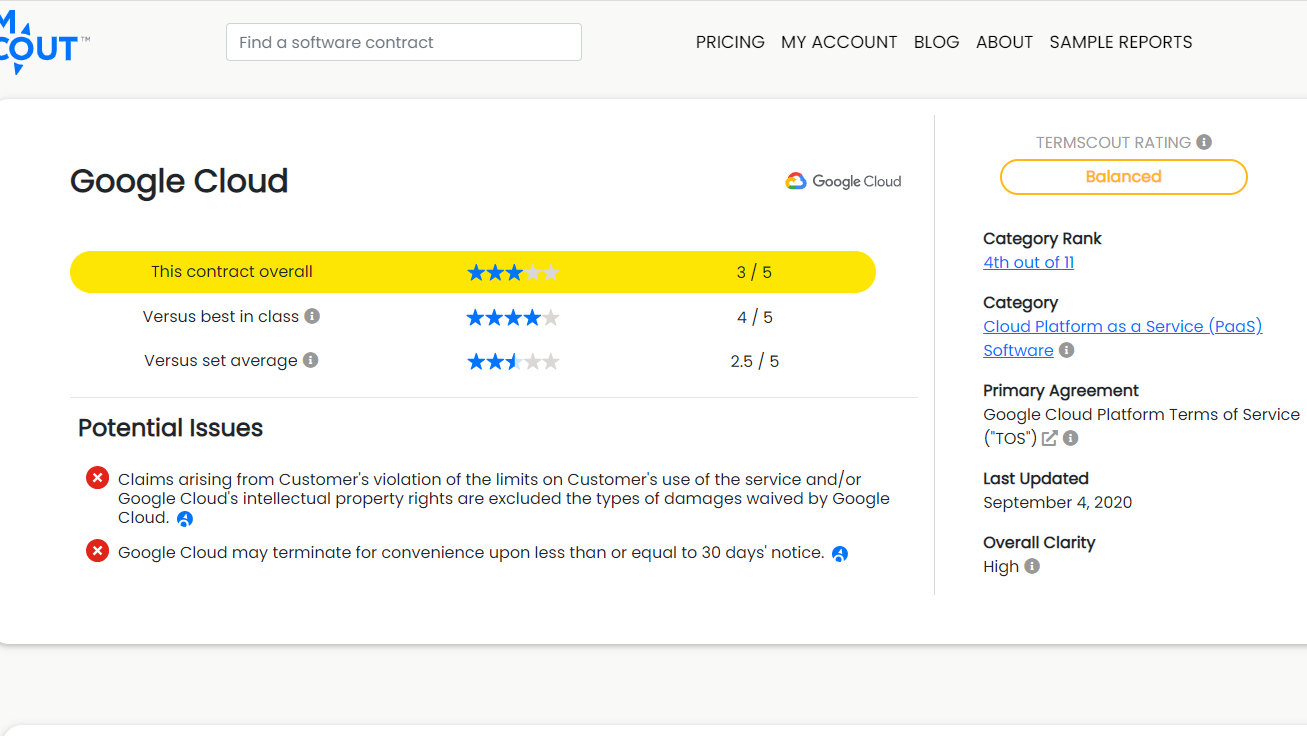TermScout is a unique legal technology startup devoted to reviewing, rating and comparing the software contracts of leading business-to-business companies so that software buyers can better and more easily understand what they are being asked to sign.
Today it marked its official launch with the release of the first major set of its customer-favorability ratings, evaluating the contracts of 150 top SaaS companies, including well-known brands such as Salesforce, AWS, Google, Microsoft and Solarwinds.
“For the first time, the world can easily and affordably understand and compare the terms their vendors impose on them,” founder and CEO Otto Hanson said in a statement announcing the release. “We believe that commerce is optimal when customers can quickly identify vendors with reasonable terms and ‘click-accept’ those contracts without friction.”
The ratings and summaries allow the public to quickly compare contract provisions in different software categories to see what’s market, Hanson told me in an email. The ratings are benchmarked against the contracting principles of the World Commerce & Contracting organization.
While today marks its official launch, the Denver, Colo., company has been operating since 2018 and has raised $1.9 million in outside investment. It won the Global Legal Hackathon in 2018, was part of the fourth cohort in 2019 of the LexisNexis Legal Tech Accelerator, and was part of the 2020 Techstars accelerator in Boulder, Colo.
(It is also currently in the running for a spot in the 2021 ABA TECHSHOW Startup Alley.)
How It Works
TermScout analyzes standard vendor IT contracts to provide both buyers and sellers with information on what is the market standard for a particular contract and its key terms.
“For every contract reviewed, TermScout extracts the same 600+ data points and then applies a standard scoring algorithm,” a blog post today explained. “This consistent analysis allows TermScout to compare competing vendors’ contracts on an apples-to-apples basis.”
After searching for a contract, the user is presented with a succinct summary of its key details, which includes:
- Rating. The contract’s overall favorability rating.
- Potential Issues. Key issues in the contract that buyers should pay most attention to.
- Comparisons. How the contract compares to both the best-in-class and set average for the category.
From there, TermScout drills down into analysis of how the contract treats specific topics, such as limitations of liability, indemnification, confidentiality, and the like. For each topic, it shows a customer-favorability rating ranging from “very unfavorable” to “very favorable.”
It also provides summaries of the substantive questions with the topic — what TermScout describes as “a laymen’s term report on what the contract says” — as well as a comparison of how the ratings for a provision vary among vendors within the category.
Pricing and Coverage
TermScout is launching today with analyses of the contracts used by some 150 software vendors in 74 product categories. You can see the full list here. It will add more contracts on a regular basis.
There is no cost to search TermScout and view the summary rating. Users who wish to view the deeper analysis have the option of either purchasing a report on a specific contract or a subscription to view everything on the platform.
The subscription if $199 per month per seat. (Through April 2, 2021, TermScout is offering a 20% launch discount by using the code ScoutLaunch20 in the checkout.)
 Robert Ambrogi Blog
Robert Ambrogi Blog